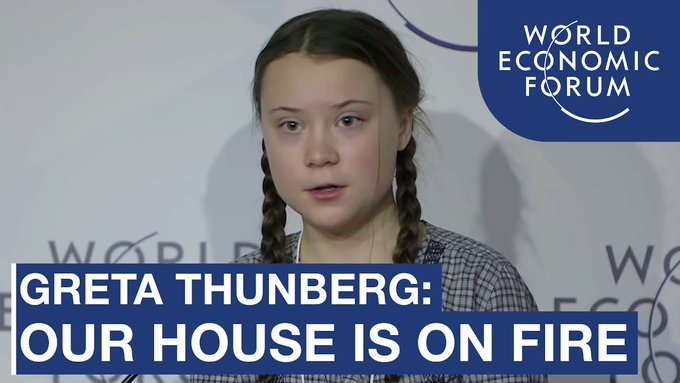Thread from April 2, 2020.
"Science shows that early exposure to circumstances that produce persistent #fear and chronic #anxiety can have lifelong consequences by disrupting the developing architecture of the brain."
[National Scientific Council on the Developing Child, 2010]
"Science shows that early exposure to circumstances that produce persistent #fear and chronic #anxiety can have lifelong consequences by disrupting the developing architecture of the brain."
[National Scientific Council on the Developing Child, 2010]
"While some of these experiences are one-time events and others may reoccur or persist over time, all of them have the potential to affect how children learn, solve problems, and relate to others."
This is a topic worthy of discussion. Consider WEF& #39;s rapidly accelerating consolidation of global power. In Jan 2019 WEF exploited the climate crisis by deliberately inciting #fear - in tandem with partners & media. Today it exploits the COVID-19 pandemic.
#TerrorEchoChambers
#TerrorEchoChambers
"I want you to panic"
"I want you to panic"
"I want you to panic"
"I want you to panic"
"I want you to panic"
"I want you to panic"
"I want you to panic"
"I want you to panic"
"I want you to panic"
"I want you to panic"
"I want you to panic"
"I want you to panic"
"I want you to panic"
"I want you to panic"
"I want you to panic"
"I want you to panic"
"I want you to panic"
"I want you to panic"
"I want you to panic"
"I want you to panic"
"I want you to panic"
"I want you to panic"
"I want you to panic"
"stress-system overload can significantly diminish a child’s ability to learn and engage in typical social interactions across the lifespan."
"Many policymakers, educators, and even medical professionals are unaware of the potentially significant, long-term risks of exposure to fear-provoking circumstances in children..."
Serious, #fear-triggering experiences cause changes in brain activity and have been shown to have long-term, adverse consequences for #learning, #behavior, and #health.
"While typical fears disappear with age, the fear and anxiety elicited by maltreatment and other threatening circumstances do not."
"Elevated stress hormones such as cortisol have been shown to affect the growth & performance of the hippocampus & the activity of the amygdala [] & early & persistent activation of the #stress response system adversely affects #brain architecture in these critical regions."
"Behavioral neuroscience research [] tells us that the prefrontal cortex is highly sensitive to the detrimental effects of excessive #stress exposure and that its developing architecture is vulnerable to the negative effects of chronic #fear."
"Very young children can actually learn to be fearful through a process called " #fear conditioning," which is strongly connected to the development of later anxiety disorders."
"For young #children who perceive the world as a #threatening place, a wide range of conditions can trigger #anxious behaviors that then impair their ability to learn and to #interact socially with others."
"Indeed, children who have had chronic and intense fearful experiences often lose the capacity to differentiate between #threat and #safety. This impairs their ability to learn and interact with others..."
"Young #children who have been exposed to traumatic circumstances also have difficulty identifying and responding to different expressions of #emotions, and, therefore, have trouble forming #healthy #relationships."
"Children do not naturally outgrow early learned fear responses over time... #Fear learning and associated memories that occur early in life get built into our brain architecture and do not dissipate with age."
"the extent to which children w/ a heightened attention bias to threat view the world as a hostile & threatening place can be viewed as both a logical adaptation to an abusive environment & a potent risk factor for behavior problems in later childhood, adolescence, & adult life."

 Read on Twitter
Read on Twitter![Thread from April 2, 2020."Science shows that early exposure to circumstances that produce persistent #fear and chronic #anxiety can have lifelong consequences by disrupting the developing architecture of the brain." [National Scientific Council on the Developing Child, 2010] Thread from April 2, 2020."Science shows that early exposure to circumstances that produce persistent #fear and chronic #anxiety can have lifelong consequences by disrupting the developing architecture of the brain." [National Scientific Council on the Developing Child, 2010]](https://pbs.twimg.com/media/EliSEl4XEAAz4Sw.png)



!["Elevated stress hormones such as cortisol have been shown to affect the growth & performance of the hippocampus & the activity of the amygdala [] & early & persistent activation of the #stress response system adversely affects #brain architecture in these critical regions." "Elevated stress hormones such as cortisol have been shown to affect the growth & performance of the hippocampus & the activity of the amygdala [] & early & persistent activation of the #stress response system adversely affects #brain architecture in these critical regions."](https://pbs.twimg.com/media/EliWyLQXYAEz_fL.png)
!["Behavioral neuroscience research [] tells us that the prefrontal cortex is highly sensitive to the detrimental effects of excessive #stress exposure and that its developing architecture is vulnerable to the negative effects of chronic #fear." "Behavioral neuroscience research [] tells us that the prefrontal cortex is highly sensitive to the detrimental effects of excessive #stress exposure and that its developing architecture is vulnerable to the negative effects of chronic #fear."](https://pbs.twimg.com/media/EliW5eFXIAIiisn.png)


